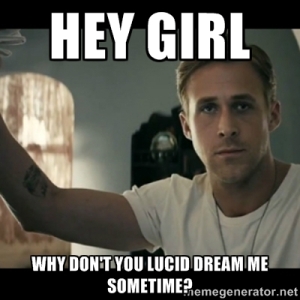This post is part of a series of guest posts on GPS by the undergraduate and graduate students in my Science vs. Pseudoscience course. As part of their work for the course, each student had to demonstrate mastery of the skill of “Educating the Public about Pseudoscience.” To that end, each student has to prepare a 1,000ish word post on a particular pseudoscience topic, as well as run a booth on-campus to help reach people physically about the topic.
______________________________________________
You may say I’m a (Lucid) Dreamer, but I’m not the Only One… by Catherine Dallman
Have you experienced the feeling of the clouds through your fingers as your soar through the sky in the middle of the night? Or what about being blown through a cannon at Cirque du Soleil? Have you been a “Superman” of sorts and saved loved ones and possibly the world from impending doom? Tasted the moon to discover it really is made of cheese? If you’ve answered “Yes!” to any of these questions, you’re probably a dreamer. But what kind of dreamer? About 1 out of every 5 Americans is a different kind of dreamer – a lucid dreamer.
 Upon beginning my research in this area, I was expecting to find overwhelming evidence debunking the concept of lucid dreaming, but to my surprise found that this is not so. For anyone new to the concept, lucid dreaming (or conscious dreaming) is the ability to be aware of a dream while you are in the midst of it. If you’re thinking of Inception now, you’re on the right track. The idea is not much different from the acclaimed film…aside from the part about all of your enemies and colleagues being joined into the same dream with the same level of consciousness. Lucid dreamers report they’ve flown in their dreams and fought creatures, among other things that would not at all be possible in reality. Speculations have been made that lucid dreaming may just be brief awakenings in the midst of a dreaming state, rather than typical parts of dreaming thought. Expert researcher in this field, Stephen LaBerge, got his Ph.D. in psychophysiology and founded The Lucidity Institute in 1987, located in Kalani, Hawaii. At the institute, researchers dedicate themselves to discovering more evidence about the craft and techniques to improve one’s skill in lucid dreaming. LaBerge conducted a study at his institute in 2000 and found scientific evidence of lucid dreaming in which the participants had a predetermined eye movement sequence they would signal once they were aware of their dreams. Respiratory and ocular muscles are part of the few voluntary muscle groups that do not become paralyzed during REM (rapid eye movement) sleep, which is why the “signal” from the participants to the researchers was an eye movement. Another study was conducted in Frankfurt, Germany by Ursula Voss in which she “zapped” her participants’ frontal lobes with a small electrical current once they reached REM sleep. 77% of participants “zapped” with 40-Hertz currents or higher (but no higher than 100-Hertz) self-reported to have experienced lucid dreaming for the first time.
Upon beginning my research in this area, I was expecting to find overwhelming evidence debunking the concept of lucid dreaming, but to my surprise found that this is not so. For anyone new to the concept, lucid dreaming (or conscious dreaming) is the ability to be aware of a dream while you are in the midst of it. If you’re thinking of Inception now, you’re on the right track. The idea is not much different from the acclaimed film…aside from the part about all of your enemies and colleagues being joined into the same dream with the same level of consciousness. Lucid dreamers report they’ve flown in their dreams and fought creatures, among other things that would not at all be possible in reality. Speculations have been made that lucid dreaming may just be brief awakenings in the midst of a dreaming state, rather than typical parts of dreaming thought. Expert researcher in this field, Stephen LaBerge, got his Ph.D. in psychophysiology and founded The Lucidity Institute in 1987, located in Kalani, Hawaii. At the institute, researchers dedicate themselves to discovering more evidence about the craft and techniques to improve one’s skill in lucid dreaming. LaBerge conducted a study at his institute in 2000 and found scientific evidence of lucid dreaming in which the participants had a predetermined eye movement sequence they would signal once they were aware of their dreams. Respiratory and ocular muscles are part of the few voluntary muscle groups that do not become paralyzed during REM (rapid eye movement) sleep, which is why the “signal” from the participants to the researchers was an eye movement. Another study was conducted in Frankfurt, Germany by Ursula Voss in which she “zapped” her participants’ frontal lobes with a small electrical current once they reached REM sleep. 77% of participants “zapped” with 40-Hertz currents or higher (but no higher than 100-Hertz) self-reported to have experienced lucid dreaming for the first time.
Logically, you would think that if you are vividly aware of your current dream, you can manipulate what happens in the dream, right? Wrong. Lucid dreaming, as it turns out, is not the same as dream control. Dream control is the ability to manipulate your dreams to be who you want, go where you want—basically anything you want to do. Lucid dreaming (real) is the awareness that you are dreaming, and dream control (not real) is manipulating what that dream is. For example, flying in a dream and being aware of it – knowing it is not possible but going along with it nonetheless—versus choosing to lift your feet off the ground and soar among the clouds is what makes the difference between lucid dreaming and dream control. While many may claim they are capable of the skill, there is not much research on the subject of dream control. Dreams are tricky enough to study, manipulate, or perform experiments with on their own, so to develop theories about how to control the dreams we have before we even truly know why we dream would be a difficult feat. Participant bias is a large obstacle that researchers face when conducting experiments on dreams and dream analysis. Sure, we can see through brain scans that a participant is dreaming, but we have no methods of discovering what they may or may not be dreaming about, other than their self-report. If we used all the support for dream control from what people say they have experienced, we would have a theory based off of purely anecdotal evidence, which is an inefficient method to form a conclusion on.
I came across a list of 12 “Amazing” Benefits of Lucid Dreaming and one of the points that the author makes is that lucid dreamers can meet and interact with their personal heroes. While, yes, this is true, any dreamer could do the same. Being a lucid dreamer just means they are aware that they are in a dream state. The author writes, “What would you ask them? …the impact these wonderful lucid conversations have had on my waking life are profound.” Meeting your idols would make for a fantastic dream, but any type of interaction you have with the individual would be anything you’ve already had in your mind, for it would not be a true interaction. The frontal lobe in our brains (where we make our decisions) shows minimal brain activity during sleep, even in lucid dreamers. This suggests that we would not have enough active cognition to carry on a meaningful conversation that would provide us with new information.
 LaBerge’s advice on lucid dreaming and possible dream control came from a Henry Ford quote and sounds eerily similar to Oprah’s favorite book The Secret, “Believe you can, believe you can’t; either way, you’re right.” He is not the only one to feel this way about lucid dreaming. In the same article, the #1 listed benefit of lucid dreaming is that you can plan your dream plots in advance. The author goes on to say, “…the more excited you are about the dream, the more likely it is to happen.” As “amazing” as it sounds, it is, unfortunately, not the case. Scientists have not yet discovered exactly why we dream, much less how to manipulate our dreams to do what we want. If we could control our dreams simply by being excited about it, I would be dreaming of vacations, beaches and Ryan Gosling instead of nightmares about impending deadlines and losing my teeth. The only evidence we have currently for controlling our dreams is anecdotal evidence or heresy, which, as we skeptics know, is not a reliable source of information.
LaBerge’s advice on lucid dreaming and possible dream control came from a Henry Ford quote and sounds eerily similar to Oprah’s favorite book The Secret, “Believe you can, believe you can’t; either way, you’re right.” He is not the only one to feel this way about lucid dreaming. In the same article, the #1 listed benefit of lucid dreaming is that you can plan your dream plots in advance. The author goes on to say, “…the more excited you are about the dream, the more likely it is to happen.” As “amazing” as it sounds, it is, unfortunately, not the case. Scientists have not yet discovered exactly why we dream, much less how to manipulate our dreams to do what we want. If we could control our dreams simply by being excited about it, I would be dreaming of vacations, beaches and Ryan Gosling instead of nightmares about impending deadlines and losing my teeth. The only evidence we have currently for controlling our dreams is anecdotal evidence or heresy, which, as we skeptics know, is not a reliable source of information.
Just to reiterate the pseudoscience here: Lucid dreaming is a true scientific aspect of the dreaming state and occurs in about 20% of the population’s lives, provoked or unprovoked. Objective data is hard to come by when dealing with dreams, but several researchers have found different methods of achieving reliable results and evidence of lucid dreaming. Dream control is a pseudoscience that is often thought as being one-in-the-same with lucid dreaming, although they are distinct from another. No concrete evidence has been found to determine what can help individuals dreams lucidly at this point. Increased cortisol from stress? Overactive frontal lobes? Too much sugar before bed? I’ll leave it to the experts. Dream on, dreamers.
